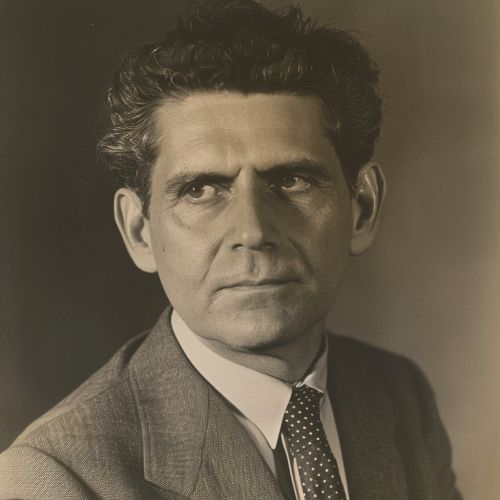Edgard Varèse
Early Life and Education
Edgard Victor Achille Charles Varèse was born on December 22, 1883, in Paris, France. He spent his early years in Paris and later moved to Turin, Italy, where he was raised by his maternal grandparents. Varèse's early exposure to both French and Italian cultures profoundly influenced his musical development. His initial interest in music was nurtured by his grandfather, who introduced him to the works of Verdi and other Italian composers.
Varèse began his formal music education at the Schola Cantorum in Paris, where he studied under Roussel and d'Indy. He later attended the Paris Conservatoire, where he studied composition with Widor and conducting with Colonne. Despite his rigorous training in traditional European music, Varèse was deeply dissatisfied with the conventional musical forms and sought new ways to express his innovative ideas.
Career and Innovations
Varèse's career can be divided into several distinct phases, each marked by significant innovations in musical composition and performance. After moving to the United States in 1915, he became a pivotal figure in the American avant-garde music scene. His early works, such as "Amériques" (1921), showcased his interest in incorporating non-traditional sounds and instruments into orchestral music. This piece, for example, includes sirens and other unconventional sound sources, reflecting his fascination with the urban soundscape of New York City.
Varèse's quest for new musical languages led him to explore the possibilities of electronic music. He was one of the first composers to recognize the potential of electronic instruments and technology in music creation. His work "Ionisation" (1931) is notable for being one of the first compositions written for percussion ensemble, utilizing a wide array of instruments to create complex, layered textures. This piece exemplifies his interest in rhythm and timbre as primary elements of musical structure.


Major Works and Contributions
Varèse's oeuvre is relatively small but highly influential. Some of his most significant works include:
- **"Hyperprism" (1923)**: This piece is characterized by its use of dissonance and unconventional orchestration, including sirens and a large percussion section. It exemplifies Varèse's interest in creating new sound worlds and breaking away from traditional harmonic and melodic structures.
- **"Intégrales" (1925)**: Written for wind and percussion, this work explores the spatial distribution of sound and the use of silence as a compositional element. It reflects Varèse's interest in the physical properties of sound and its perception by the listener.
- **"Déserts" (1954)**: One of Varèse's most ambitious projects, this piece combines live instrumental performance with pre-recorded electronic sounds. It represents a culmination of his lifelong exploration of the intersection between acoustic and electronic music.
- **"Poème électronique" (1958)**: Created for the Philips Pavilion at the Brussels World's Fair, this work is an immersive multimedia experience that combines electronic music with visual projections. It is considered one of the earliest examples of multimedia art and showcases Varèse's visionary approach to integrating different art forms.
Influence and Legacy
Varèse's impact on contemporary music cannot be overstated. He is often referred to as the "Father of Electronic Music" due to his pioneering work in the field. His innovative use of technology and unconventional sound sources paved the way for future generations of composers, including Stockhausen, Boulez, and Xenakis.
Varèse's emphasis on timbre and rhythm as primary compositional elements has had a lasting influence on various musical genres, from classical to electronic and experimental music. His ideas about the spatialization of sound and the use of silence have also been widely adopted by contemporary composers.
Personal Life and Philosophy
Varèse's personal life was marked by a relentless pursuit of artistic innovation and a deep commitment to his musical vision. He was known for his intense personality and uncompromising standards. Despite facing significant challenges, including financial difficulties and limited recognition during his lifetime, Varèse remained dedicated to his work.
His philosophical approach to music was heavily influenced by his interest in science and technology. Varèse often described his compositions as "organized sound," emphasizing the importance of structure and form in his music. He believed that music should evolve in parallel with scientific and technological advancements, and he actively sought to collaborate with engineers and scientists to realize his artistic vision.
Later Years and Death
In his later years, Varèse continued to explore new musical territories, although his output slowed due to health issues. He remained an influential figure in the music world, mentoring younger composers and advocating for the integration of technology in music education and performance.
Edgard Varèse passed away on November 6, 1965, in New York City. His legacy endures through his groundbreaking compositions and his profound influence on the development of contemporary music.
